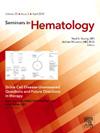Mobilizing CARs: Benefits, drawbacks, and directions for outpatient CAR T-cell therapy
IF 4.1
3区 医学
Q1 HEMATOLOGY
引用次数: 0
Abstract
Chimeric antigen receptor T-cell (CAR-T) therapy has heralded a new era in the treatment of various hematological malignancies, increasingly being utilized in earlier lines of therapy. Moreover, cellular therapies are currently under investigation for their potential in treating solid malignancies and autoimmune disorders. As the scope of indications for CAR-T therapy continues to expand, along with the associated reductions in costs and hospital admissions, many medical centers are transitioning towards outpatient CAR-T models. Moreover, ongoing efforts to mitigate complications such as cytokine release syndrome (CRS) or neurotoxicity include the development of premedication strategies, prompt management of adverse events, and the advancement of newer, safer CAR-T cell therapies. However, despite these advancements, the inherent risk of these life-threatening complications remains a critical concern in CAR-T therapy. Institutions must diligently anticipate and effectively manage these complications to ensure the safety and well-being of patients undergoing CAR-T therapy. This includes establishing robust protocols for timely identification and intervention of adverse events, and seamless pathways for transitioning patients to a higher level of care if necessary. This review provides an overview of the current landscape of outpatient CAR-T therapy and offers essential insights into the key clinical and operational considerations needed to implement a successful outpatient CAR-T program.
调动 CAR:门诊 CAR T 细胞疗法的优点、缺点和发展方向。
嵌合抗原受体 T 细胞(CAR-T)疗法开创了治疗各种血液恶性肿瘤的新纪元,越来越多地用于早期治疗。此外,目前正在研究细胞疗法在治疗实体恶性肿瘤和自身免疫性疾病方面的潜力。随着 CAR-T 疗法适应症范围的不断扩大,以及相关费用和住院率的降低,许多医疗中心正在向门诊 CAR-T 模式过渡。此外,为减少细胞因子释放综合征(CRS)或神经毒性等并发症,正在进行的努力包括制定前期用药策略、及时处理不良事件以及开发更新、更安全的 CAR-T 细胞疗法。然而,尽管取得了这些进步,这些危及生命的并发症的固有风险仍然是 CAR-T 疗法的关键问题。医疗机构必须努力预测并有效控制这些并发症,以确保接受 CAR-T 疗法的患者的安全和健康。这包括建立健全的方案,及时发现和干预不良事件,以及在必要时将患者转至更高水平治疗的无缝路径。本综述概述了门诊 CAR-T 疗法的现状,并就成功实施门诊 CAR-T 计划所需的关键临床和操作注意事项提供了重要见解。
本文章由计算机程序翻译,如有差异,请以英文原文为准。
求助全文
约1分钟内获得全文
求助全文
来源期刊

Seminars in hematology
医学-血液学
CiteScore
6.20
自引率
2.80%
发文量
30
审稿时长
35 days
期刊介绍:
Seminars in Hematology aims to present subjects of current importance in clinical hematology, including related areas of oncology, hematopathology, and blood banking. The journal''s unique issue structure allows for a multi-faceted overview of a single topic via a curated selection of review articles, while also offering a variety of articles that present dynamic and front-line material immediately influencing the field. Seminars in Hematology is devoted to making the important and current work accessible, comprehensible, and valuable to the practicing physician, young investigator, clinical practitioners, and internists/paediatricians with strong interests in blood diseases. Seminars in Hematology publishes original research, reviews, short communications and mini- reviews.
 求助内容:
求助内容: 应助结果提醒方式:
应助结果提醒方式:


